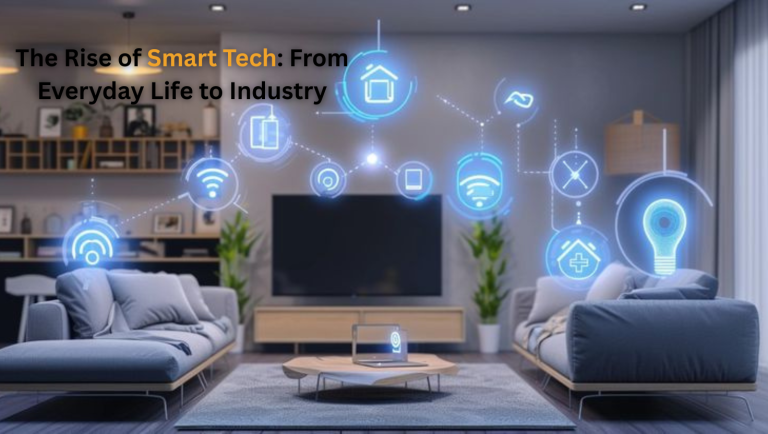omanreport brings you an eye-opening deep dive into the fascinating world of smart technology and how it’s transforming every corner of our lives — from the moment we wake up to the most complex industrial operations. Smart tech isn’t just about convenience anymore; it’s about reshaping the way we live, work, and even think. Whether you’re a tech enthusiast or just someone curious about the future, this exploration will show you why smart technology is not just a trend — it’s the new normal.
The Evolution of Smart Technology
From Science Fiction to Daily Reality
Once upon a time, smart technology belonged in science fiction books and blockbuster movies. Today, we have homes that talk back to us, cars that park themselves, and devices that know our schedules better than we do. The rise of AI-powered gadgets has turned science fiction into our daily routine, making life more seamless and efficient.
Key Milestones in Smart Tech History
Smart technology didn’t just happen overnight. It grew from early computer networks, the internet boom, and advances in machine learning. From the first smart thermostats to entire AI-powered factories, the evolution has been rapid — and it’s only getting faster.
Smart Tech in Everyday Life
Smarter Homes for Smarter Living
Smart homes are no longer futuristic concepts. With connected lighting systems, voice assistants, and intelligent appliances, we can control entire households with a smartphone. This isn’t just about luxury — it’s about saving energy, improving security, and making life easier.
Wearable Technology and Personal Health
Wearables have redefined how we look at personal health. Smartwatches and fitness trackers now monitor heart rate, sleep patterns, and even stress levels. This data allows users to take control of their health in ways that were impossible a decade ago.
Transportation Gets an Upgrade
Electric vehicles, self-driving cars, and app-based ride-sharing platforms are proof that transportation is becoming smarter. These technologies aim to reduce traffic, lower emissions, and make commuting safer and faster.
Smart Tech in Business and Industry
Revolutionizing Manufacturing
Factories of the future are already here. Smart sensors and IoT devices monitor production lines, detect issues before they cause problems, and streamline operations to minimize waste. This shift to Industry 4.0 means higher efficiency and lower costs.
Data-Driven Decisions
Businesses today run on data — and smart tech collects, analyzes, and interprets that data faster than ever. From AI-powered customer service bots to predictive analytics that forecast market trends, decision-making is now backed by real-time intelligence.
The Rise of Remote Work Technology
Smart tech has made remote work possible on a massive scale. Cloud collaboration tools, video conferencing platforms, and AI-powered project management systems allow teams to work together seamlessly across continents.
The Challenges of Smart Tech
Privacy Concerns
The more connected we become, the more vulnerable our data is. From hacked security cameras to social media data leaks, privacy is a major concern. Balancing innovation with security will remain one of the biggest challenges.
Dependence on Technology
As technology becomes more integrated into daily life, we risk overdependence. Power outages or internet failures can disrupt everything from grocery orders to healthcare systems.
Ethical and Social Implications
AI and automation raise big questions about job security, human creativity, and the boundaries of machine decision-making. Governments and companies are still figuring out how to set fair and ethical guidelines.
The Future of Smart Technology
AI as the Next Frontier
Artificial Intelligence will continue to grow more powerful, more intuitive, and more deeply embedded into our lives. Expect to see AI in education, medicine, entertainment, and even law enforcement.
Sustainability and Smart Solutions
Smart tech can play a huge role in creating a more sustainable planet. Smart grids, water monitoring systems, and AI-driven agriculture will help reduce waste and optimize resource use.
The Human-Technology Partnership
Rather than replacing humans, future technology may focus on enhancing our capabilities — making us more creative, more productive, and more connected than ever before.
FAQs
What is considered smart technology?
Smart technology refers to devices or systems that use sensors, connectivity, and AI to make decisions, automate tasks, or provide personalized user experiences.
How is smart tech used in everyday life?
It’s used in smart homes, wearable devices, connected cars, healthcare monitoring, entertainment streaming, and even grocery shopping through automated ordering systems.
Is smart technology safe to use?
Generally yes, but users must be mindful of data privacy and security. Using secure passwords, enabling two-factor authentication, and keeping devices updated are key steps to staying safe.
Will smart technology replace human jobs?
Some repetitive tasks may be automated, but new jobs are being created in AI development, cybersecurity, data analysis, and more. The focus is shifting toward jobs that require human creativity and problem-solving.
How will smart tech impact the future?
It will make life more efficient, personalized, and interconnected. From medicine to education, expect smarter, faster, and more precise solutions to global problems.
Conclusion
Smart technology is no longer just a luxury; it is a necessity that drives innovation and efficiency across every aspect of modern life. From personal gadgets to industrial automation, it continues to break boundaries and shape the way we live. As perujournal.com highlights, the key is not just to adopt these technologies but to understand and use them responsibly. The future belongs to those who can balance technological growth with ethics, privacy, and human connection. The rise of smart tech isn’t slowing down — and neither should we.


